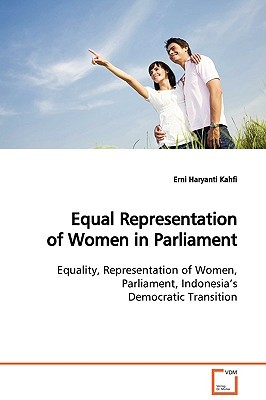
- We will send in 10–14 business days.
- Author: Erni Haryanti Kahfi
- Publisher: VDM Verlag
- ISBN-10: 3639125789
- ISBN-13: 9783639125788
- Format: 15.2 x 22.9 x 1.3 cm, softcover
- Language: English
- SAVE -10% with code: EXTRA
Reviews
Description
Over the last two decades international development agencies have promoted worldwide women's quota as an affirmative action to improve women's abysmally low representation in politics. Indonesia has often been receptive to international policy efforts and the pursuit of women's equal political representation gained momentum after the downfall of Suharto's authoritarian government in the 1998. This work discusses the myriad of pathways to increasing women representation learned from women that had been elected to the National Parliament in Indonesia in the 1999 free democratic election. By exploring mainstream and feminist discourse on democracy, representation and women's empowerment within the context of new Indonesia's democratic atmosphere and paternalistic political culture significant findings emerge about women's association with certain social economical political circles; women's ability to challenge the dominant gender ideology of 'ibuism'; resistance to women's quota; and concern about on women's and/or children's issues. This work will be useful to women activists, politicians and policy makers, international development institutions and scholars of South East Asia.
EXTRA 10 % discount with code: EXTRA
The promotion ends in 17d.15:16:40
The discount code is valid when purchasing from 10 €. Discounts do not stack.
- Author: Erni Haryanti Kahfi
- Publisher: VDM Verlag
- ISBN-10: 3639125789
- ISBN-13: 9783639125788
- Format: 15.2 x 22.9 x 1.3 cm, softcover
- Language: English English
Over the last two decades international development agencies have promoted worldwide women's quota as an affirmative action to improve women's abysmally low representation in politics. Indonesia has often been receptive to international policy efforts and the pursuit of women's equal political representation gained momentum after the downfall of Suharto's authoritarian government in the 1998. This work discusses the myriad of pathways to increasing women representation learned from women that had been elected to the National Parliament in Indonesia in the 1999 free democratic election. By exploring mainstream and feminist discourse on democracy, representation and women's empowerment within the context of new Indonesia's democratic atmosphere and paternalistic political culture significant findings emerge about women's association with certain social economical political circles; women's ability to challenge the dominant gender ideology of 'ibuism'; resistance to women's quota; and concern about on women's and/or children's issues. This work will be useful to women activists, politicians and policy makers, international development institutions and scholars of South East Asia.


Reviews